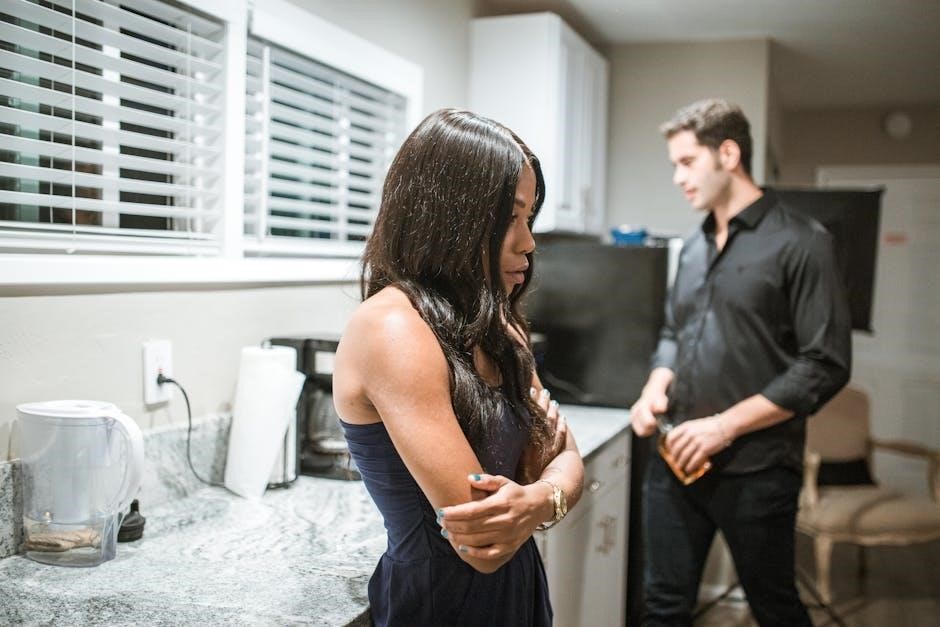Drama Free: A Guide to Managing Unhealthy Family Relationships by Nedra Glover Tawwab offers a compassionate approach to navigating family dynamics. It provides practical steps to break cycles of dysfunction and foster healthier connections, empowering individuals to create meaningful change while staying true to their needs.
Understanding the Prevalence of Family Drama
Family drama is a universal experience, manifesting in various forms such as sibling conflicts, generational patterns, or emotional turmoil. It’s important to recognize that no two families are alike, and what may seem minor to one person can feel overwhelming to another. Drama often stems from inherited behaviors, unresolved traumas, or unrealistic expectations. In many cases, these dynamics are deeply ingrained, making them challenging to address. However, acknowledging the prevalence of family drama is the first step toward change. By understanding that these patterns are not unique to your family, you can begin to see them as opportunities for growth rather than sources of shame. Drama Free emphasizes that while family stories shape us, they don’t define us. This guide encourages readers to approach these challenges with empathy and clarity, offering practical tools to navigate even the most complex relationships.
The Importance of Addressing Unhealthy Patterns
Addressing unhealthy patterns in family relationships is crucial for personal well-being and fostering a drama-free environment. Ignoring these issues can lead to emotional distress, strained connections, and the perpetuation of harmful cycles. Drama Free highlights that these patterns often stem from unresolved trauma, neglect, or chaotic upbringings, which can deeply affect mental health. By confronting these dynamics, individuals can break free from toxic behaviors and cultivate healthier interactions. The guide emphasizes that change is possible, but it requires intentional effort and a willingness to challenge long-standing norms. Understanding the root causes of these patterns is the first step toward healing and creating a more balanced family life. This process not only benefits the individual but also future generations, offering a pathway to break the cycle of dysfunction and build stronger, more loving relationships.
Setting Boundaries for a Drama-Free Life

Setting boundaries is essential for creating a drama-free life and maintaining emotional well-being. Drama Free emphasizes that boundaries are not about cutting ties but about protecting your mental and emotional space. By establishing clear limits, you prevent over-involvement in others’ issues and safeguard your own needs. This guide offers practical advice on how to communicate these boundaries effectively, ensuring they are respected without guilt or conflict. Boundaries also help reduce unnecessary drama by clarifying expectations and promoting mutual respect. For instance, learning to say “no” or limiting discussions about sensitive topics can significantly reduce stress. Over time, consistent boundary-setting fosters healthier relationships and empowers individuals to live authentically. Remember, boundaries are not rigid rules but tools for creating balance and harmony in your life. By prioritizing your well-being, you pave the way for more peaceful and meaningful family interactions.

Identifying Dysfunctional Family Dynamics
Dysfunctional family dynamics often involve patterns of abuse, chaos, or neglect that become normalized. Recognizing these behaviors is crucial for addressing unhealthy relationships and fostering positive change. Understanding these dynamics is the first step toward healing and creating a more balanced family environment.
Recognizing Abuse, Chaos, and Neglect
Abuse, chaos, and neglect within families often manifest in subtle or overt ways, becoming normalized over time. These dynamics can include emotional, verbal, or even physical harm, creating an environment of fear and instability. Chaos may present as unpredictable behavior or constant conflict, while neglect can leave individuals feeling unheard or unimportant. Recognizing these patterns is essential for addressing unhealthy relationships. Abuse and neglect can be hidden behind seemingly loving actions or justified as “tough love,” but their impact on mental health is profound. Over time, such dynamics can lead to low self-esteem, difficulty trusting others, or struggles with intimacy. Identifying these behaviors requires self-awareness and a willingness to confront painful truths. By acknowledging these patterns, individuals can begin to break free from toxic cycles and work toward healthier, more balanced relationships. Understanding the signs of abuse, chaos, and neglect is the first step toward healing and creating a more supportive family environment.
Understanding the Impact of Emotional Neglect
Emotional neglect, often overlooked, can have profound effects on individuals, leaving them feeling unheard or unimportant. It can manifest as a lack of validation, dismissive behavior, or unresponsive caregiving, which may seem benign but deeply affects self-esteem and trust. Over time, this can lead to struggles with intimacy, difficulty expressing emotions, and a pervasive sense of emptiness. Emotional neglect can be particularly damaging because it often occurs alongside seemingly loving actions, making it hard to recognize. Its impact is not immediate but accumulates, shaping how individuals view themselves and their worth. Addressing emotional neglect requires acknowledging its presence and understanding its role in shaping behaviors and relationships. By recognizing these patterns, individuals can begin to heal and develop healthier ways of connecting with others. This process is crucial for breaking cycles of neglect and fostering more emotionally supportive family dynamics.
Breaking the Cycle of Unhealthy Behaviors
Breaking the cycle of unhealthy behaviors in family relationships requires a combination of self-awareness, intentional action, and support. Often, these patterns are passed down through generations, making them deeply ingrained and challenging to recognize. The first step is identifying the specific behaviors or dynamics that perpetuate dysfunction, such as emotional neglect, enabling, or conflict avoidance. Once these patterns are acknowledged, individuals can begin to challenge and change them. Setting clear boundaries is a powerful tool for disrupting unhealthy cycles, as it establishes limits on what is acceptable. Additionally, seeking support through therapy or support groups can provide guidance and accountability. It’s important to recognize that breaking the cycle is not about blaming others but about taking responsibility for your own actions and choices. Over time, these efforts can lead to healthier, more balanced relationships and a more fulfilling family dynamic. This process is not easy, but it is essential for creating lasting change.

Practical Steps for Creating Healthy Changes

Drama Free offers actionable strategies, such as setting boundaries and practicing healthy love, to transform family dynamics. These steps empower individuals to create lasting change and foster more respectful, balanced relationships.
Forgiveness vs. Change: Knowing the Difference
In Drama Free, Nedra Glover Tawwab emphasizes the distinction between forgiveness and change. Forgiveness is an internal process that frees you from emotional burdens, while change requires actionable steps to improve relationships. Understanding this difference is crucial for healing. Forgiveness doesn’t always lead to reconciliation, nor does it mean ignoring harm. Change, however, involves effort from all parties to create healthier dynamics. Tawwab provides tools to navigate this balance, such as setting boundaries and practicing healthy communication. She stresses that forgiveness is not about excusing others but about releasing negativity. Meanwhile, change requires accountability and willingness to grow. This chapter helps readers prioritize their well-being while addressing the complexities of family relationships. By distinguishing between forgiveness and change, individuals can make informed decisions about how to move forward, whether through reconciliation or setting distance. This clarity empowers readers to create a path that aligns with their values and needs.
Practicing Healthy Love and Respect
Healthy love and respect in family relationships are foundational to creating a drama-free environment. In Drama Free, Nedra Glover Tawwab highlights the importance of setting boundaries while maintaining love and respect. Healthy love isn’t about sacrificing your needs but ensuring mutual respect and understanding. Tawwab emphasizes that respect doesn’t require agreement; it’s about valuing each person’s perspective. Practicing active listening and empathy can foster deeper connections. Healthy love also involves recognizing that family roles don’t automatically equate to healthy dynamics. By prioritizing respect, individuals can avoid toxic patterns and cultivate a sense of safety. Tawwab provides practical advice on how to express love without enabling unhealthy behaviors. This approach encourages personal growth and strengthens relationships. Ultimately, healthy love and respect are about balance—loving others while honoring your own needs and boundaries. This mindset helps families move away from drama and toward harmony.
Challenging Harmful Messages From Others
Challenging harmful messages from family members is a crucial step in managing unhealthy relationships. In Drama Free, Nedra Glover Tawwab provides guidance on how to address toxic communication patterns. Harmful messages often stem from dysfunctional family dynamics, where negative beliefs or behaviors are normalized. Tawwab emphasizes the importance of recognizing these messages and refusing to internalize them. This involves setting clear boundaries and practicing self-compassion. Challenging harmful messages doesn’t mean confrontation but rather standing firm in your values and needs. Tawwab suggests using techniques like the “gray rock” method to remain neutral and unemotional in the face of provocation. By doing so, you can reduce drama and create space for healthier interactions. It’s also important to surround yourself with supportive people who reinforce positive messages. Ultimately, challenging harmful messages is about reclaiming your power and fostering a more respectful environment. This process is essential for breaking toxic cycles and promoting emotional well-being.
Communication Strategies for Difficult Conversations
Drama Free offers practical tools for navigating tough talks. Nedra Glover Tawwab suggests active listening, staying calm, and using the “gray rock” method to de-escalate conflicts, fostering clearer, more respectful communication.
Creating a Toolkit for Challenging Discussions
Building a toolkit for difficult conversations is essential for managing unhealthy family relationships. Nedra Glover Tawwab emphasizes the importance of preparation and self-awareness. Start by identifying your emotional triggers and practicing active listening; Use “I” statements to express feelings without blaming others, fostering a safer environment for dialogue. Incorporate boundary-setting techniques, such as the “gray rock” method, to remain neutral and unemotional during conflicts. Additionally, develop a pre-conversation plan to stay focused on your goals. Tools like scripting responses or role-playing can help you stay calm and assertive. Finally, prioritize self-care before and after discussions to maintain emotional resilience. By equipping yourself with these strategies, you can navigate challenging conversations with clarity and confidence, paving the way for healthier family dynamics.
Addressing Cognitive Distortions in Family Relationships
Cognitive distortions, such as black-and-white thinking or overgeneralization, often fuel unhealthy family dynamics. These distortions can lead to miscommunication and reinforce harmful patterns. For instance, assuming the worst about a family member’s intentions or believing that one negative interaction defines the entire relationship can escalate conflicts. To address this, it’s crucial to identify and challenge these distortions. Start by practicing self-awareness and questioning assumptions. Ask yourself, “Is this thought based on facts or emotions?” Encourage open dialogue by expressing feelings without blame and seeking clarification. Additionally, fostering empathy can help reframe perspectives and reduce misunderstandings. By addressing cognitive distortions, you can create a more balanced and constructive communication environment. Remember, changing these patterns takes time and effort, but it’s a vital step toward healthier family relationships. Therapy or counseling can also provide additional tools to navigate these challenges effectively.
What to Say When Ending a Relationship

Ending a relationship, especially with a family member, is never easy, but clear communication is key. It’s important to be honest while remaining respectful. Start by expressing your feelings using “I” statements, such as, “I feel hurt when…” or “I need…” to avoid sounding accusatory. Be specific about the reasons for ending the relationship, but avoid blaming or attacking. For example, “I’ve realized that this dynamic isn’t healthy for me, and I need to set boundaries to protect my well-being.” It’s also important to listen to their perspective, even if you disagree, to maintain dignity. Finally, be firm and direct about your decision, leaving no room for misinterpretation. Remember, you don’t owe anyone a lengthy explanation, but kindness and clarity can help both parties move forward. Ending a relationship is difficult, but prioritizing your emotional health is essential for long-term peace.
Navigating the Process of Ending Relationships
Ending relationships, especially with family, is challenging but sometimes necessary for emotional well-being. Clear communication, boundaries, and self-care are essential to navigate this process with dignity and clarity.

Deciding When to End a Relationship
Deciding when to end a relationship, especially with family, is a deeply personal and often painful process. It requires honest self-reflection and an assessment of whether the relationship is causing more harm than good. Drama Free emphasizes that ending a relationship is not about giving up but about recognizing when it has become unsustainable or toxic. Signs that it may be time to end a relationship include consistent stress, lack of respect, or unresolved conflicts that repeatedly resurface. The decision should prioritize your emotional and mental well-being, even if it means setting boundaries or distancing yourself. Family ties can complicate this process, but it’s important to remember that staying in an unhealthy relationship can perpetuate cycles of dysfunction. Ultimately, ending a relationship is about choosing to invest in your own growth and peace, even when it feels difficult or heartbreaking.
Understanding and Explaining Ghosting
Drama Free sheds light on ghosting as a coping mechanism in family relationships, where one person abruptly cuts off communication without explanation. This behavior often stems from emotional overwhelm, fear of conflict, or a history of unresolved issues. Ghosting can leave the other party feeling confused, hurt, and invalidated, leading to a breakdown of trust and intimacy. While it may provide temporary relief for the person initiating it, ghosting often perpetuates cycles of dysfunction and avoids addressing the root causes of the relationship problems. Understanding ghosting requires empathy for the complexities of human behavior while also acknowledging its impact on others. The book emphasizes the importance of communication and accountability in healing and moving forward. By addressing ghosting directly, individuals can work toward healthier ways of navigating conflicts and building more authentic connections.
The Grieving Process After a Relationship Ends
Drama Free acknowledges the profound emotional impact of ending a family relationship, which often leads to a grieving process. This process is natural, as it involves letting go of the relationship as it once was. Grieving may include feelings of sadness, anger, or even relief, depending on the circumstances. The book emphasizes that everyone’s experience with grief is unique and valid, and there’s no set timeline for healing. It’s important to allow oneself to feel these emotions fully while seeking support from trusted individuals or professionals. The grieving process also involves reflecting on the relationship’s dynamics and acknowledging the loss of what could never be. By understanding and working through these emotions, individuals can begin to rebuild their sense of self and move toward a healthier, more fulfilling life. The book offers compassionate guidance to navigate this challenging journey with self-care and resilience.
Reconciliation and Moving Forward
Drama Free provides guidance on reconciliation, emphasizing understanding when it’s possible and when it’s healthier to move on. It offers tools to navigate family challenges with clarity, fostering growth and healthier relationships through boundaries and self-awareness.

When and How to Reconcile
In Drama Free, Nedra Glover Tawwab provides a clear roadmap for determining when reconciliation is possible and how to approach it. Reconciliation requires self-reflection, accountability, and mutual effort from all parties involved. Tawwab emphasizes that reconciliation isn’t always the best path, as it’s essential to prioritize personal well-being. She offers practical advice on setting boundaries and communicating effectively to rebuild trust. The book highlights the importance of understanding the root causes of conflict and ensuring that both parties are willing to work toward healthier dynamics. Tawwab also stresses that reconciliation doesn’t mean ignoring past hurts but rather creating a foundation for moving forward respectfully. By focusing on clarity, empathy, and growth, individuals can make informed decisions about whether reconciliation aligns with their values and goals. Ultimately, the guide empowers readers to approach reconciliation with a mindset of self-awareness and emotional resilience.
Improving Relationships Through Therapy

Drama Free by Nedra Glover Tawwab highlights the transformative role of therapy in addressing and improving unhealthy family relationships. As a licensed therapist, Tawwab provides practical insights into how therapy can help individuals and families identify and break free from dysfunctional patterns. She emphasizes the importance of understanding emotional neglect, communication barriers, and the impact of past trauma on current relationships. Tawwab’s approach encourages readers to seek therapy as a safe space for self-reflection, healing, and growth. By addressing cognitive distortions and learning healthier ways to express emotions, therapy can foster empathy and respect within families. Tawwab also underscores the value of therapy in teaching effective conflict resolution and boundary-setting skills. Her guide empowers individuals to take proactive steps toward healing, ensuring that therapy becomes a cornerstone for building stronger, more resilient relationships. Through therapy, families can move beyond drama and cultivate a more loving and supportive environment.
Practicing Healthier Family Dynamics
Drama Free by Nedra Glover Tawwab emphasizes the importance of fostering healthier family dynamics by addressing root causes of dysfunction. Tawwab provides actionable strategies for creating a more loving and respectful environment, starting with self-awareness and boundary-setting. She highlights the need to recognize and challenge harmful patterns, such as emotional neglect or enabling behaviors, that perpetuate drama. By promoting open communication and emotional accountability, families can shift from toxic interactions to meaningful connections. Tawwab also stresses the value of mutual respect, encouraging individuals to express their needs clearly while listening to others. Her guide offers practical tools for breaking cycles of dysfunction and replacing them with healthier habits. Through consistent effort and a willingness to grow, families can move beyond drama and cultivate relationships built on trust, empathy, and understanding. Tawwab’s approach empowers readers to take control of their family dynamics and create a more harmonious home life.

Seeking Closure and Further Growth
Closure is essential for healing and moving forward. Drama Free offers insights and resources to help individuals find peace and grow beyond unresolved conflicts, fostering healthier relationships and personal well-being.
Understanding the Importance of Closure
Closure is a vital step in healing from unhealthy family relationships. It allows individuals to process unresolved emotions and gain clarity, helping them move forward without lingering pain. Drama Free emphasizes that closure isn’t about forgetting but about releasing the emotional burden of past conflicts. By addressing unmet needs and unresolved issues, closure fosters personal growth and healthier relationships. The book provides practical advice on how to achieve closure, whether through direct communication or internal reflection. It also highlights that closure is a personal journey, unique to each individual, and doesn’t always require the other party’s involvement. Ultimately, closure empowers individuals to break free from toxic patterns and embrace a more fulfilling life. This process is crucial for rebuilding self-esteem and creating boundaries that promote emotional well-being.
Further Reading and Resources
For those seeking additional guidance, Drama Free: A Guide to Managing Unhealthy Family Relationships by Nedra Glover Tawwab is a valuable resource. The book offers practical advice and real-life examples to help readers navigate complex family dynamics. It also provides tools for identifying dysfunctional patterns and breaking cycles of unhealthy behaviors. Additionally, Tawwab’s other works, such as Find Peace, complement this guide by focusing on setting boundaries and improving relationships. Online platforms like Google Play Books offer easy access to these resources, allowing readers to explore topics at their own pace. The book is praised for its relatable approach and empowering insights, making it a must-read for anyone striving to create healthier family relationships. By leveraging these resources, individuals can gain a deeper understanding of their family dynamics and take meaningful steps toward positive change.
Quotes and Insights for Reflection
Drama Free: A Guide to Managing Unhealthy Family Relationships by Nedra Glover Tawwab offers powerful insights and quotes that encourage reflection and growth. One notable quote emphasizes, “Every family has a story, and it’s likely not your preferred ideal.” This resonates with readers who struggle to reconcile their family’s reality with their personal aspirations. Tawwab’s words remind us that change begins with self-awareness and acceptance. Another impactful statement highlights, “You can’t pour from an empty cup. Take care of yourself first.” This underscores the importance of prioritizing one’s well-being in dysfunctional family dynamics. The book also encourages readers to reflect on their roles in perpetuating unhealthy patterns, urging them to break free from cycles of drama and negativity. By blending compassion with practical advice, Tawwab’s insights empower individuals to redefine their relationships and embrace healthier ways of connecting. These quotes and reflections serve as a catalyst for meaningful change and personal growth.
